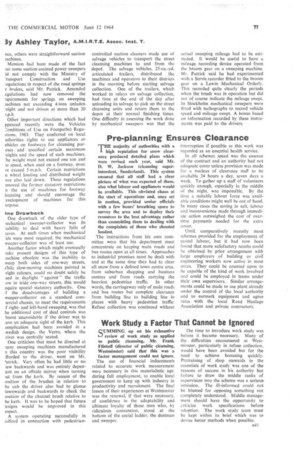Pre-planning En sures Clearance
Page 79

If you've noticed an error in this article please click here to report it so we can fix it.
majority of authorities with a Thigh reputation for snow clearance produced detailed plans which were revised each year, said Mr. D. W. Jackson (cleansing superintendent, Sunderland). This system ensured that all staff had a clear picture of what was expected of them, also what labour and appliances would be available. This obviated chaos at the start of operationsand, once set in motion, provided senior officials with a few hours' breathing space to survey the area and to deploy their resources to the best advantage rather than committing them to dealing with the complaints of those who shouted loudest.
The instructions from his own com mittee were that his department must concentrate on keeping main roads and bus routes open at all times. Approaches to industrial premises must be dealt with and at the same time they had to clear all snow from a defined town centre area, from suburban shopping and business centres and from roads carrying the heaviest pedestrian traffic. In other words, the carriageway only of main roads and bus routes but complete clearance from building line to building line in places with heavy pedestrian traffic. Refuse collection was continued without interruption if possible as this work was regarded as an essential health service.
In all schemes speed was the essence of the contract and an authority had not adequate cover unless provision was made for a nucleus of clearance staff to be available 24 hours a day, seven days a week. To gather up a staff of volunteers quickly enough, especially in the middle of the night, was impossible. 13), the time a suitable labour force was available conditions might well be out of hand. in many cases the saving in salt, labour and inconvenience made through immediate action outweighed the cost of overtime payments needed for the extra cover.
Until comparatively recently most schemes provided for the employment of casual labour, but it had now been found that more satisfactory results could he obtained by prior arrangement with large employers of building or civil engineering workers now active in most areas. They could be counted upon to he capable of the kind of work involved and could be employed in teams under their own supervisors. Similar arrangements could be made to use plant already under the control of the local authority and to earmark equipment and agree rates with the local Road Haulage Association and private contractors.
































































































































